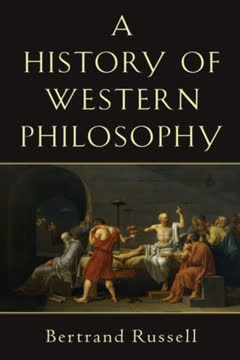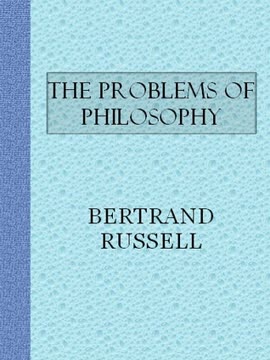Key Takeaways
1. Religious Dogma Impedes Rational Thinking and Moral Progress
"Intelligence is impeded by any creed, no matter what; and kindness is inhibited by the belief in sin and punishment."
Intellectual Obstruction. Russell argues that religious dogma fundamentally constrains human intellectual and moral development. By establishing predetermined frameworks of thought, religious systems discourage critical examination and independent reasoning.
Mechanisms of Suppression:
- Presenting absolute truths that cannot be questioned
- Punishing intellectual curiosity
- Creating psychological barriers to rational investigation
- Maintaining power through fear and ignorance
Consequences of Dogmatic Thinking. When societies prioritize religious doctrine over empirical evidence and rational inquiry, they risk stagnating intellectual progress, limiting scientific understanding, and perpetuating outdated social structures that harm human potential.
2. Fear and Emotional Manipulation are Core Foundations of Religious Belief
"Religion is based, I think, primarily and mainly upon fear. It is partly the terror of the unknown, and partly the wish to feel that you have a kind of elder brother who will stand by you in all your troubles and disputes."
Psychological Origins. Russell identifies fear as the primary motivational force behind religious belief, demonstrating how human psychological vulnerabilities are exploited by religious institutions to maintain control and compliance.
Fear Manifestations:
- Terror of death and the unknown
- Desire for supernatural protection
- Anxiety about existential meaninglessness
- Need for psychological comfort in uncertain environments
Emotional Exploitation. Religious systems strategically leverage human emotional needs, offering simplistic explanations and imaginary protections that discourage genuine understanding of complex existential challenges.
3. Scientific Inquiry and Intellectual Integrity Trump Theological Certainty
"What the world needs is not dogma, but an attitude of scientific inquiry, combined with a belief that the torture of millions is not desirable."
Rational Approach. Russell champions scientific methodology as superior to theological reasoning, emphasizing empirical evidence, critical thinking, and openness to revising beliefs based on new information.
Scientific Virtues:
- Commitment to observable evidence
- Willingness to challenge existing assumptions
- Prioritizing human welfare over doctrinal purity
- Continuous learning and adaptation
Intellectual Evolution. By promoting scientific inquiry, societies can move beyond rigid belief systems and develop more nuanced, compassionate approaches to understanding human experience.
4. Morality Exists Independent of Religious Doctrine
"There is no reason to think that an action becomes moral or immoral merely by being forbidden or commanded by God."
Ethical Foundations. Russell argues that moral behavior emerges from human empathy, reason, and social cooperation, not from religious commandments or supernatural dictates.
Moral Development:
- Kindness as a fundamental ethical principle
- Rational consideration of consequences
- Empathy and understanding
- Commitment to reducing human suffering
Universal Values. Moral principles transcend religious boundaries, rooted in shared human experiences and collective social understanding rather than divine revelation.
5. Religious Institutions Historically Suppress Individual Freedom
"Every Church develops an instinct of self-preservation and minimises those parts of the founder's doctrine which do not minister to that end."
Institutional Dynamics. Russell exposes how religious organizations systematically restrict individual thought and autonomy to maintain institutional power and control.
Suppression Mechanisms:
- Censorship of alternative perspectives
- Punishing intellectual dissent
- Creating psychological barriers to independent thinking
- Maintaining hierarchical power structures
Historical Pattern. Throughout history, religious institutions have consistently opposed social progress, scientific understanding, and individual liberties.
6. The Concept of Sin Damages Psychological and Social Development
"The sense of sin which dominates many children and young people and often lasts on into later life is a misery and a source of distortion that serves no useful purpose of any sort or kind."
Psychological Harm. Russell argues that the concept of sin creates unnecessary psychological trauma, particularly in young people, by inducing artificial guilt and restricting natural human experiences.
Negative Consequences:
- Inducing unwarranted shame
- Creating unhealthy sexual repression
- Generating irrational guilt
- Distorting natural emotional development
Alternative Approach. Russell advocates for understanding human behavior through compassion, scientific understanding, and rational evaluation rather than moralistic condemnation.
7. Academic and Intellectual Freedom are Essential for Human Progress
"Academic freedom cannot be used as a cloak to promote evil, but it must protect the right to challenge existing beliefs."
Intellectual Liberty. Russell emphasizes the critical importance of protecting academic freedom as a fundamental mechanism for societal advancement and knowledge generation.
Freedom's Significance:
- Protecting diverse perspectives
- Challenging established narratives
- Encouraging critical thinking
- Preventing intellectual stagnation
Institutional Responsibility. Educational institutions must prioritize open inquiry and intellectual exploration over conformity and ideological control.
8. Sexual Ethics Should Prioritize Human Happiness Over Arbitrary Moral Codes
"There is nothing bad in sex, and the conventional attitude in this matter is morbid."
Rational Sexuality. Russell advocates for a more open, scientific, and compassionate approach to human sexuality, rejecting repressive and arbitrary moral restrictions.
Ethical Principles:
- Consent and mutual respect
- Understanding psychological health
- Rejecting shame-based sexual education
- Prioritizing individual happiness
Societal Transformation. By developing more rational and empathetic sexual ethics, societies can reduce psychological harm and promote healthier human relationships.
9. Critical Thinking Requires Challenging Established Religious Narratives
"Intelligence, it might be said, has caused our troubles; but it is not unintelligence that will cure them."
Intellectual Courage. Russell encourages systematic questioning of established religious narratives, emphasizing the importance of rational examination and intellectual honesty.
Critical Thinking Strategies:
- Challenging inherited beliefs
- Seeking empirical evidence
- Maintaining intellectual humility
- Valuing reason over tradition
Cognitive Liberation. By developing critical thinking skills, individuals can free themselves from restrictive ideological frameworks.
10. Humanity Needs Reasonableness and Tolerance, Not Dogmatic Beliefs
"What the world needs is reasonableness, tolerance, and a realisation of the interdependence of the parts of the human family."
Collaborative Humanity. Russell advocates for a global perspective prioritizing mutual understanding, cooperation, and rational problem-solving over divisive ideological conflicts.
Constructive Principles:
- Emphasizing shared human experience
- Promoting cross-cultural understanding
- Valuing empirical problem-solving
- Rejecting absolutist thinking
Collective Progress. By embracing reasonableness and tolerance, humanity can address complex global challenges more effectively.
Last updated:
FAQ
What's Why I Am Not a Christian about?
- Critique of Religion: Bertrand Russell critiques Christianity and organized religion, arguing they are untrue and harmful. He explores the emotional and moral implications of religious beliefs.
- Philosophical Exploration: Russell examines philosophical arguments for God's existence, such as the First Cause and design arguments, finding them unconvincing and often based on emotion rather than evidence.
- Personal Convictions: The book reflects Russell's journey and convictions about religion, advocating for a rational, evidence-based understanding of life and existence.
Why should I read Why I Am Not a Christian?
- Intellectual Challenge: The book challenges readers to critically think about religion and morality, questioning established norms through thought-provoking arguments.
- Historical Context: It provides insight into early 20th-century religious debates, relevant for understanding contemporary discussions on faith and reason.
- Influential Work: As a seminal text in atheistic literature, it has influenced secularism and rationalism, deepening understanding of modern philosophical discourse.
What are the key takeaways of Why I Am Not a Christian?
- Religion as Harmful: Russell argues that organized religion perpetuates dogma and intolerance, hindering moral progress.
- Emotional Basis of Belief: He suggests that religious beliefs are often accepted due to emotional needs rather than logical reasoning.
- Rational Inquiry: Russell advocates for a rational approach to ethics and existence, urging individuals to seek knowledge through evidence.
What are the best quotes from Why I Am Not a Christian and what do they mean?
- "Religion is based... upon fear.": Russell views fear of the unknown as a primary driver for religious belief, suggesting faith is emotionally rather than rationally founded.
- "The whole conception of God... despotisms.": He critiques the authoritarian nature of religious belief, likening God to a tyrannical ruler.
- "I think that all the great religions... harmful.": Russell expresses skepticism towards all organized religions, asserting they are flawed and detrimental to progress.
What arguments does Russell present against the existence of God?
- First Cause Argument: Russell critiques this by questioning why God wouldn't need a cause if everything else does, challenging the necessity of a universe's beginning.
- Natural Law Argument: He argues that natural laws describe behavior rather than dictate it, opposing the idea of a lawgiver.
- Argument from Design: Russell suggests that life's complexity can be explained by evolution, not divine design, pointing to suffering and evil as contradictions to a benevolent designer.
How does Russell define morality in Why I Am Not a Christian?
- Human-Centric Morality: Russell believes morality should focus on human welfare and happiness, not religious dogma.
- Critique of Religious Morality: He argues that religious moral codes often lead to cruelty and suffering, hindering moral progress.
- Rational Ethics: Russell advocates for a moral framework based on reason and evidence, promoting a just and humane society.
How does Russell address the concept of immortality in Why I Am Not a Christian?
- Skepticism about Survival: Russell doubts the self's survival after death, linking personal identity to the physical brain.
- Emotional Basis for Belief: He suggests belief in immortality stems from fear of death and a desire for continuity, lacking rational evidence.
- Critique of Religious Promises: Russell argues that religious claims of an afterlife are unsubstantiated and emotionally driven.
What is the significance of the debate between Russell and Father Copleston in Why I Am Not a Christian?
- Philosophical Exchange: The debate examines arguments for and against God's existence, highlighting the clash between faith and reason.
- Clarification of Positions: It clarifies Russell's views on religion and morality, emphasizing logical reasoning in faith discussions.
- Impact on Modern Thought: The debate remains relevant in contemporary atheism and theism discussions, illustrating Russell's arguments' ongoing significance.
What is Russell's view on sexual ethics in Why I Am Not a Christian?
- Critique of Conventional Morality: Russell argues that traditional sexual ethics are outdated and misaligned with modern understanding.
- Advocacy for Freedom: He supports sexual freedom in consensual relationships, emphasizing personal choice without unwanted consequences.
- Importance of Consent: Russell stresses mutual consent and affection as guiding principles, opposing rigid moral codes.
How does Why I Am Not a Christian relate to contemporary issues?
- Relevance to Modern Ethics: Russell's discussions on morality resonate with today's debates on sexual freedom and personal relationships.
- Critique of Dogmatism: The book's critique of dogmatic beliefs is pertinent amid rising religious fundamentalism affecting public policy.
- Call for Rational Inquiry: Russell's emphasis on rational inquiry is crucial in an age of misinformation and ideological polarization.
How does Russell's personal experience influence his views in Why I Am Not a Christian?
- Background and Education: Russell's religious upbringing and philosophical education shaped his critical stance towards religion.
- Intellectual Journey: His exploration of various philosophical schools informed his rejection of dogmatic beliefs.
- Moral Convictions: Russell's commitment to humanism and social justice drives his advocacy for rational, evidence-based ethics.
Review Summary
Why I Am Not a Christian and Other Essays on Religion and Related Subjects receives mostly positive reviews for its clear, logical arguments against religion, particularly Christianity. Readers appreciate Russell's wit and rationality, though some find his critiques superficial or outdated. Many view it as an influential work in secular thought, praising Russell's courage in challenging religious dogma. Some religious readers disagree with his conclusions but still find value in engaging with his ideas. The book's relevance to modern debates on religion and secularism is frequently noted.
Similar Books









Download PDF
Download EPUB
.epub digital book format is ideal for reading ebooks on phones, tablets, and e-readers.










